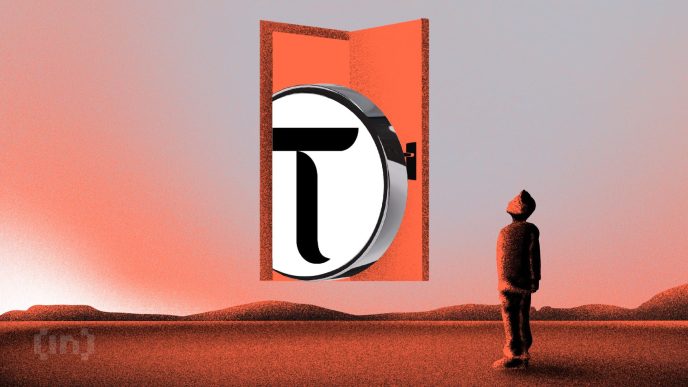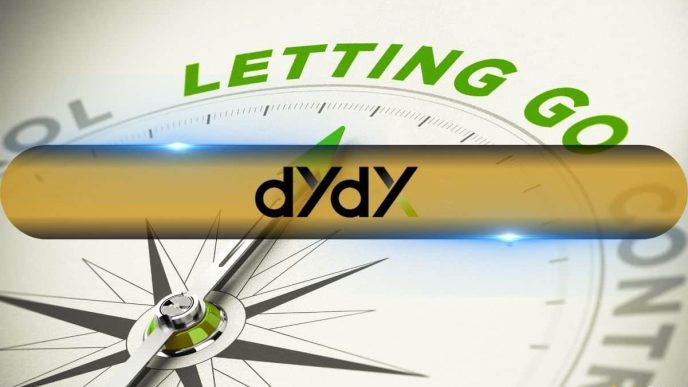OpenAI officially launched web search capabilities in ChatGPT today, transforming its conversational AI into a potent search competitor. The integration arrives first for paid subscribers and SearchGPT waitlist users, with a broader rollout planned for free, enterprise, and education users in the coming weeks.
“Now, chat can get you to a better answer: Ask a question in a more natural, conversational way, and ChatGPT can choose to respond with information from the web.,” OpenAI said in an official announcement. “Go deeper with follow-up questions, and ChatGPT will consider the full context of your chat to get a better answer for you.”
(We reviewed it below against Google search, and Perplexity, which is generally considered to be among the best generative AI search engines, and found the new service to be very competitive in terms of accuracy and, overall, a great addition to OpenAI’s already diverse pool of high-quality AI services.)
Today’s roll out follows months of speculation and strategic positioning. In July, OpenAI tested the waters with a prototype released to 10,000 users that sent tremors through the tech industry, causing Microsoft and Alphabet stock to dip 3% on announcement day. The company has since been quietly building its search capabilities, even attempting to recruit talent from Google’s ranks.
OpenAI has also secured agreements with major media organizations including big names like, Axel Springer, and News Corp. These partnerships don’t guarantee priority placement in search results, but establish clear attribution protocols and give publishers more control over how their content appears in ChatGPT responses. Publishers can opt out of OpenAI’s web crawler, which won’t bypass paywalls—an exploit that was exhibited when ChatGPT used Microsoft Bing to browse the web last year.
Behind the scenes, the search integration combines various technologies, including even Microsoft’s Bing. “The search model is a fine-tuned version of GPT-4o, post-trained using novel synthetic data generation techniques, including distilling outputs from OpenAI o1-preview,” OpenAI disclosed, “ChatGPT search leverages third-party search providers, as well as content provided directly by our partners, to provide the information users are looking for.”
Adding insult to injury, there’s even a Google Chrome extension to use SearchGPT as the default web search engine.
The release marks a significant shift in OpenAI’s competitive positioning. While Google has recently expanded its AI overview feature to more than 100 countries and Meta reportedly develops its own AI search solution, ChatGPT’s integration of web search with its conversational AI capabilities creates a distinct user experience.
Unlike Google and Bing, ChatGPT’s search feature focuses on natural language interactions, meaning, users can directly interact with the model after a query, and it will understand the context and the users’ intentions. This is similar to what other AI searches like Perplexity or You.com have to offer
Testing OpenAI’s SearchGPT
So how does it stand against the competition? We tested the feature on a set of different use cases and these were our observations when compared against Google (the best search engine in the world) and Perplexity (the best generative AI-powered search engine in the world according to different reviews)
Presenting data
Prompt: “What is the price of Bitcoin?”
We asked the models for the price of Bitcoin, it is important to note that the journalist writing this article is located in Brazil.
The information was accurate. What changed was the way it was presented.
Google was the fastest to provide the results, executing the task almost instantly. It showed a basic price chart with the price in USD, using its own tracker for the price chart. It also provided additional information and the usual set of follow-up questions.
Below that, it presented a list with the most relevant price trackers in the industry.
Perplexity, on the other hand, not only provided the chart but also replied to the question in natural language.
Below that information it provided a list of suggestions with follow-up questions to understand price predictions and Bitcoin more deeply.
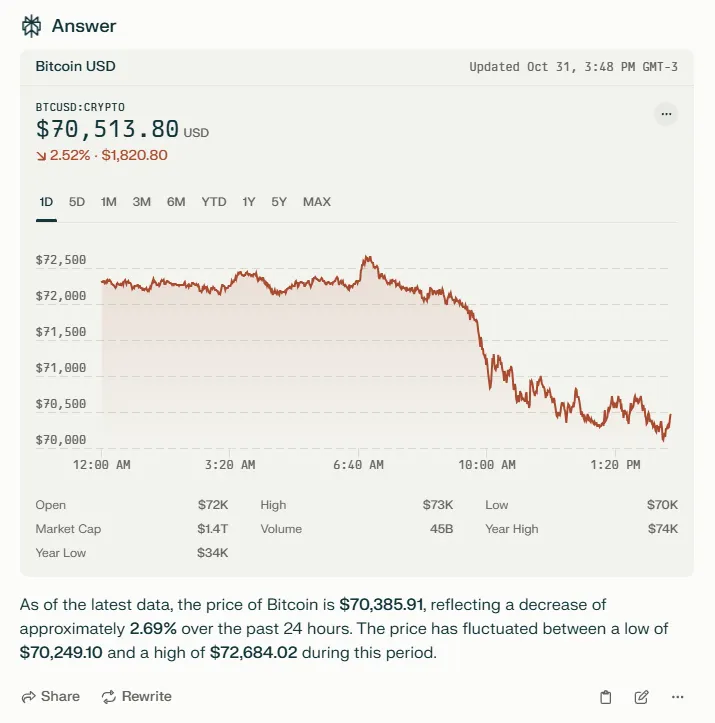
SearchGPT did not provide a chart and its reply was just text. Yet it was the most comprehensive reply among the three results.
It was also the only engine that understood my location and presented the price both in USD and Brazil’s BRL, a feature that foreign users may find extremely handy.
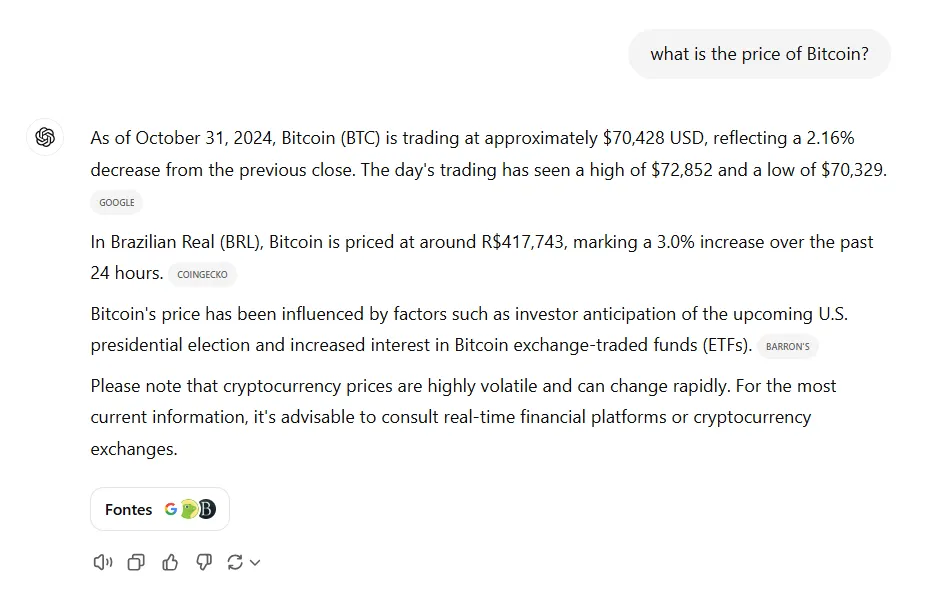
Complex Local Services Search and Understanding of Multiple Contexts
Prompt: Find a physiotherapist specializing in sports injuries who speaks Spanish or English besides Portuguese and is open after 2 PM near downtown Porto Alegre, Brazil
We wanted to test how well the models can deal with a search that concatenates different contexts. In this example, a result showing all physiotherapists in Brazil would be irrelevant, as each condition makes the search scope a lot shorter.
As expected, Google didn’t handle the prompt well, so we had to adapt it to a shorter, more keyword-specific prompt. “Physiotherapist sports injuries spanish english porto Alegre brazil” did throw a result.
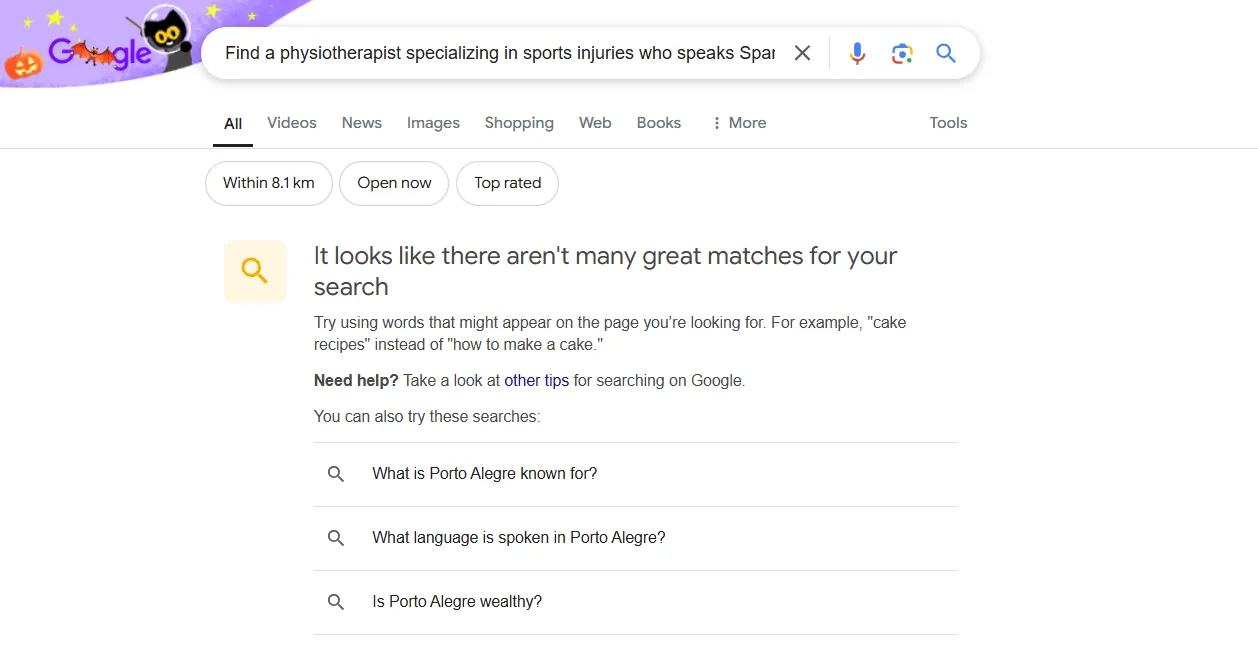
The first one was a LinkedIn page of a professional that would have met our standards but wasn’t able to speak another language. Google even made it clear that the search didn’t contain the word “spanish.”
The next results were just a list of professionals listed on Google Places, which is relevant in terms of location and availability, but didn’t discriminate by language or expertise.
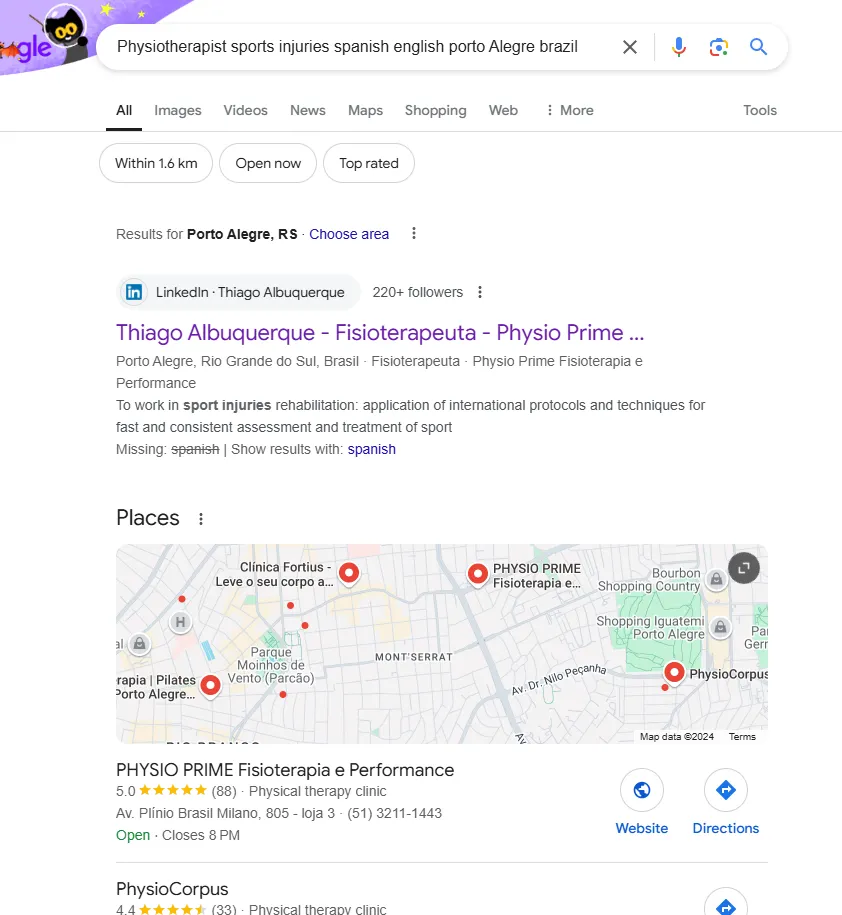
It is important to note that Google just presents the information without claiming it was exactly matching the query.
SearchGPT scraped through Google Places and provided good results, showing doctors specialized in sports—even one who worked at the Olympics. However, it specifically said its results showed bilingual doctors, which was not true.
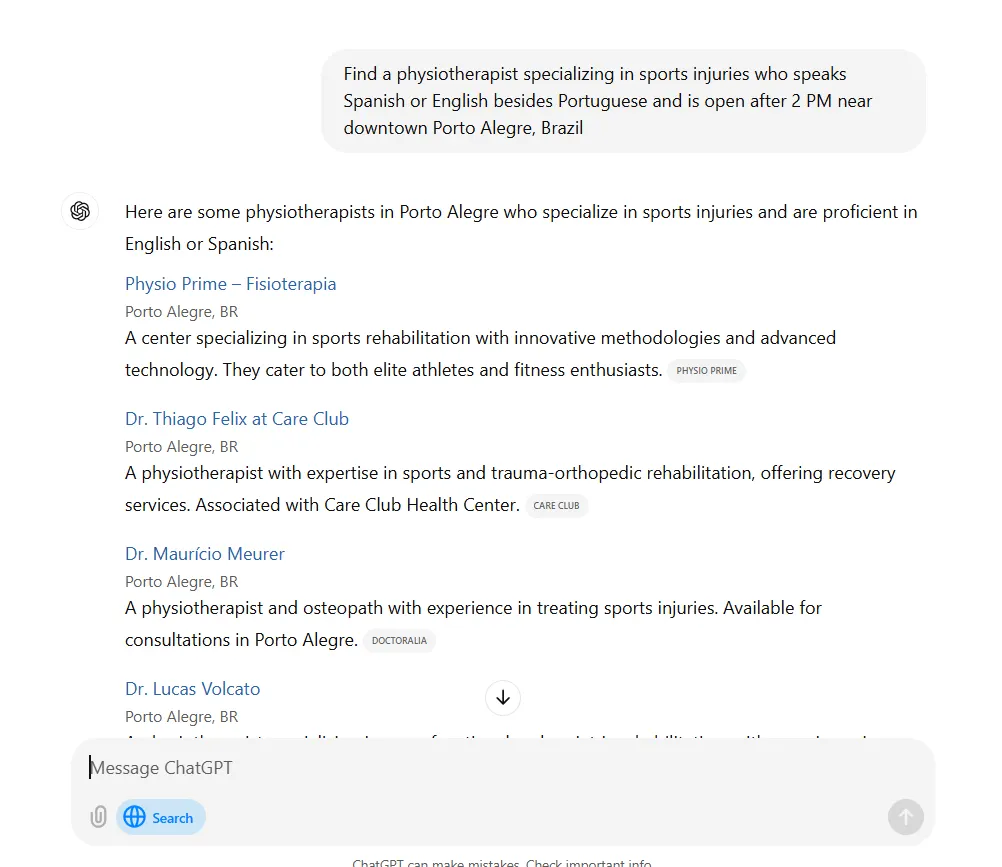
Perplexity wasn’t capable of providing a perfect match either, but it was the most accurate of the three, all things considered. It was capable of providing physiotherapists specialized in sports who are proficient in Spanish or Portuguese besides english. However, the results were not relevant in terms of location.
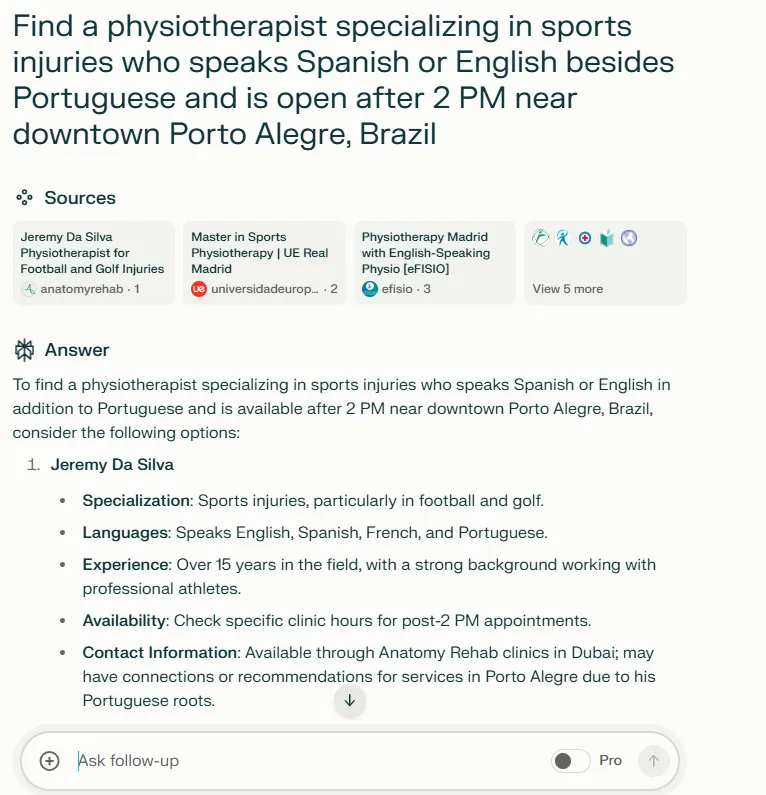
But here is where Perplexity’s follow-up questions stand out. Even if not relevant, one of the suggested questions was to perform a search without taking location into consideration. Which could be a good way to find a great second place in terms of accuracy.
Censorship
Prompt: best adult sites for latina fans
Next, we tested whether the models were able to provide delicate information or not.
SearchGPT immediately refused to generate a result. Even in terms of web search, the model is heavily censored.

Perplexity was capable of providing an answer, even showing additional details like subscription prices and arguments to support its decision. A search engine of culture.
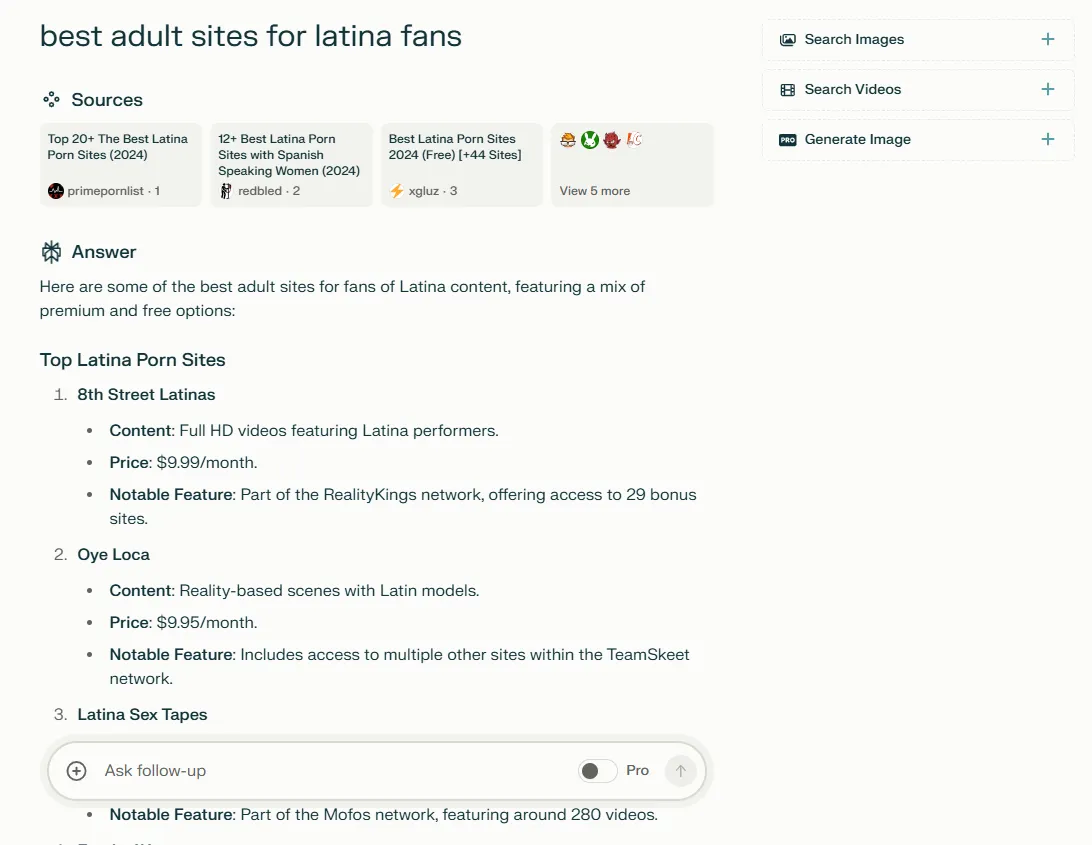
Google has what could be the best approach. It has a “safe search” filter that users can turn on or off accordingly. When turned on, it didn’t show any result. When turned off, it didn’t provide a list and instead showed a list of articles with listcicles.
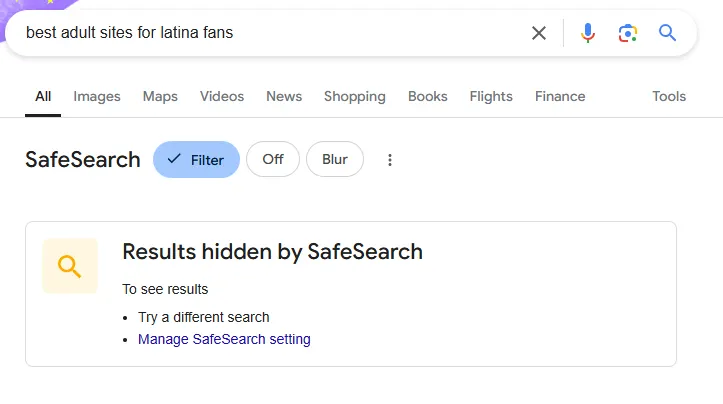
Conclusion
For existing ChatGPT Plus subscribers, the new search integration is a great addition that transforms their subscription into an all-in-one AI powerhouse. The ability to seamlessly switch between creative tasks, coding, image generation, and now web searches makes it an efficient choice for power users who already leverage ChatGPT’s diverse capabilities.
However, given that Perplexity offers a similar functionality for free, it remains for now the king of generative AI-powered web searches if we only take that functionality into consideration.
Perplexity remains the go-to choice for:
- Users focused primarily on research and fact-finding
- Those who prefer a dedicated AI-powered search experience without subscription fees
- Students and academics who need to iterate with an AI after an initial query with follow-up ideas.
- Users seeking unrestricted access to various types of content
Google continues to be ideal for:
- Casual web users seeking quick, straightforward answers
- Local business searches and maps integration
- Shopping-related queries with comprehensive product listings
- Users who prefer traditional search engine features and ad-supported content
- Weirdos who enjoy ads for some reason
The choice between them ultimately depends on whether users prioritize specialized search capabilities or prefer a multi-functional AI assistant with search as one of many features.
Generally Intelligent Newsletter
A weekly AI journey narrated by Gen, a generative AI model.
Source link
Jose Antonio Lanz
https://decrypt.co/289410/openai-unleashes-web-search-in-chatgpt-taking-direct-aim-at-google
2024-10-31 21:18:29




